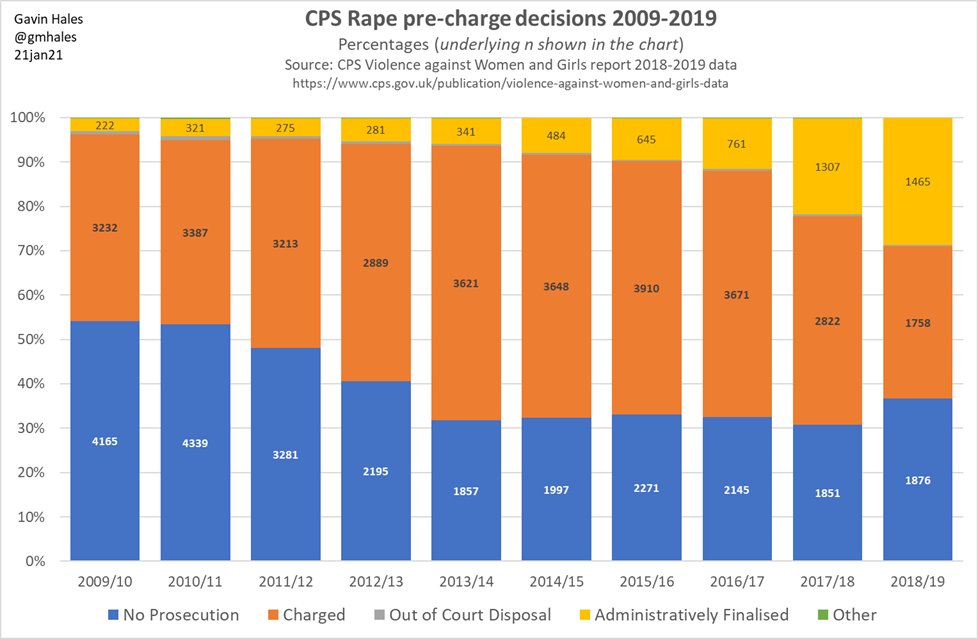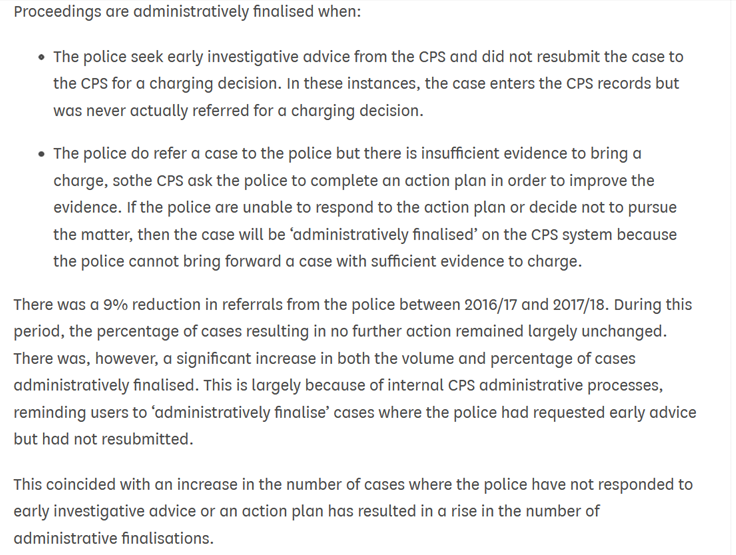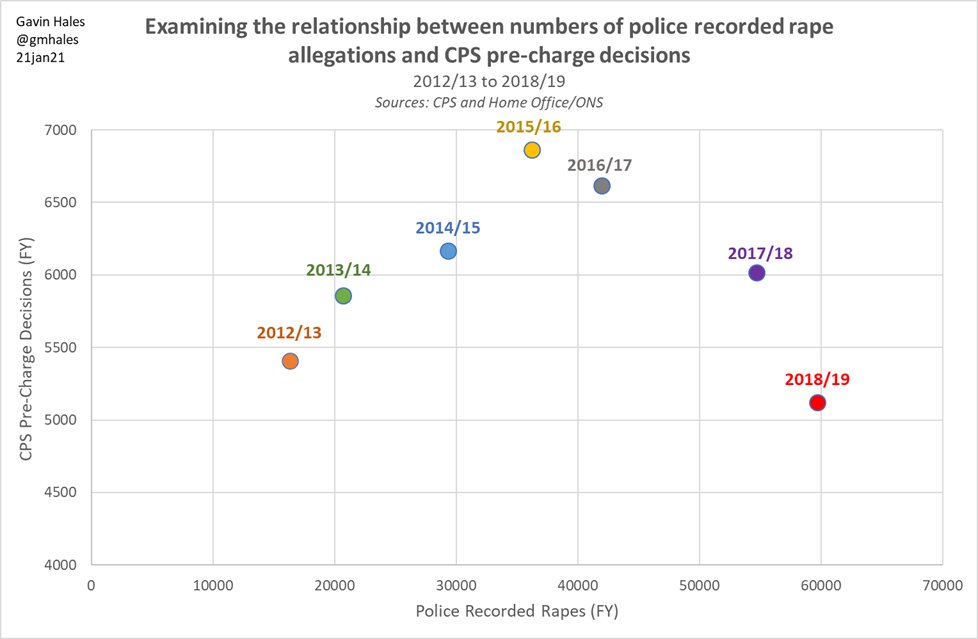The other day I had a look at what has been happening to police recorded rapes in E&W - finding huge increases but also wide variations in trends between forces. Here I'm going to go a bit further.
https://twitter.com/gmhales/status/1351136700584620033
1/ Thread
https://twitter.com/gmhales/status/1351136700584620033
1/ Thread
Following some comments I saw yesterday about falling charges by @cpsuk, I had a quick look at CPS data - and I'll post a couple of charts here.
Here, first, is the total number of CPS pre-charge decisions relating to rape cases, by financial year.
2/
Here, first, is the total number of CPS pre-charge decisions relating to rape cases, by financial year.
2/
Second, here is how the composition of @cpsuk pre-charge decisions in rape cases have changed over time, using CPS 'Violence Against Women & Girls data' at https://www.cps.gov.uk/publication/violence-against-women-and-girls-data.
The chart shows percentages of decisions each year; the totals are shown on the bars for ref.
3/
The chart shows percentages of decisions each year; the totals are shown on the bars for ref.
3/
It is striking that (a) the % not prosecuted fell fr 2009/10 to 2013/14, since when (b) it has been virtually flat, around 31-33% (slight rise in 18/19 to 37%). (c) Note how the % 'administratively finalised' increases throughout the time period, esp in 17/18.
4/
4/
(d) Mirroring the consistent % not prosecuted, the % either charged or 'administratively finalised' has remained pretty constant since 2013/14 (again 18/19 is an outlier):
13/14: 67.7%
14/15: 67.1%
15/16: 66.5%
16/17: 67.0%
17/18: 68.7%
18/19: 63.0%
5/
13/14: 67.7%
14/15: 67.1%
15/16: 66.5%
16/17: 67.0%
17/18: 68.7%
18/19: 63.0%
5/
(Take out the administratively finalised cases and the prosecution rate remains pretty constant - falling very slightly - between 2013/14 and 2017/18, with a larger fall in 2018/19.)
6/
6/
Back to the full data: the progressive reducn in % charged is almost entirely offset by the increased % 'admin finalised'.
My 1st thought, knowing some rape cases take a long time to conclude, was this might suggest most 'admin finalised' cases end up as charges given time.
7/
My 1st thought, knowing some rape cases take a long time to conclude, was this might suggest most 'admin finalised' cases end up as charges given time.
7/
But: 'admin finalised' (AF) is problematic b/c it includes cases referred to the CPS but returned to police forces without a charging decision (so they may return to the CPS later... or police may NFA).
8/
https://questions-statements.parliament.uk/written-questions/detail/2019-06-07/261500
8/
https://questions-statements.parliament.uk/written-questions/detail/2019-06-07/261500
That there have apparently been changes in the use/recording of AF is also problematic, though I'm not aware of the detail. E.g are these cases that weren't recorded at all? Were they being rec as 'not prosecuted'? Unclear.
Can anyone point me to evidence that clarifies?
9/
Can anyone point me to evidence that clarifies?
9/
To repeat: there's a lot potentially tangled up in the 'admin finalised' category. Will they reduce over time as longer-running cases gradually reach the point at which the CPS makes a firm charging decision? Have they been NFAd by police?
10/
10/
That incidentally points to a problem with the lack of join-up between police, CPS and HMCTS data, which means that case-level attrition is hard to assess.
11/
11/
There is one other piece of evidence I looked at, comparing the number of rape allegations recorded by police, and the number of pre-charge decisions recorded by the CPS. It's an interesting story, again begging more Qs.
12/
12/
Fr 2012/13 to 15/16, as the no of police recorded rape allegations increased (x axis), so did the no of CPS decisions (y axis). Thereafter, however, the former kept increasing while the latter collapsed.
It looks like police forces have been referring fewer cases.
12/
It looks like police forces have been referring fewer cases.
12/
There's a lot to unpick. Why are police forces recording so many more rape allegations? What are the implications for investigator case loads, case timescales/throughput, investigative quality, CPS decision making and prosecution numbers? What impacts have bail reforms had?
13/
13/
Some apparently see the fall in prosecutions as the result (seemingly exclusively) of an alleged change in CPS charging practice. Even if there had been such a change - the CPS disputes it - it seems to me there is an awful lot else going on that needs to be unpicked.
14/
14/
Thanks for reading. If you find my analyses interesting, please consider supporting me at https://ko-fi.com/gmhales . Many thanks.

 Read on Twitter
Read on Twitter









